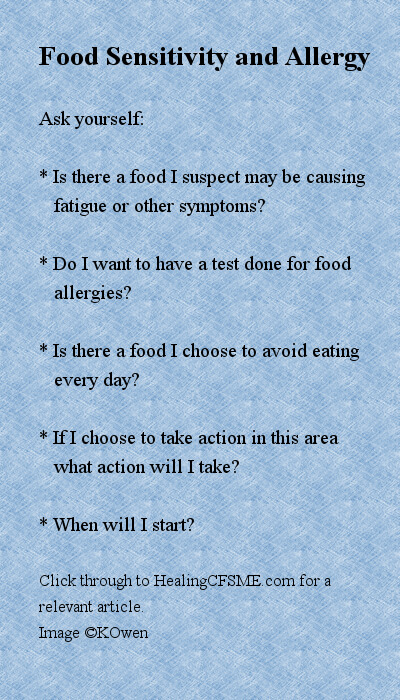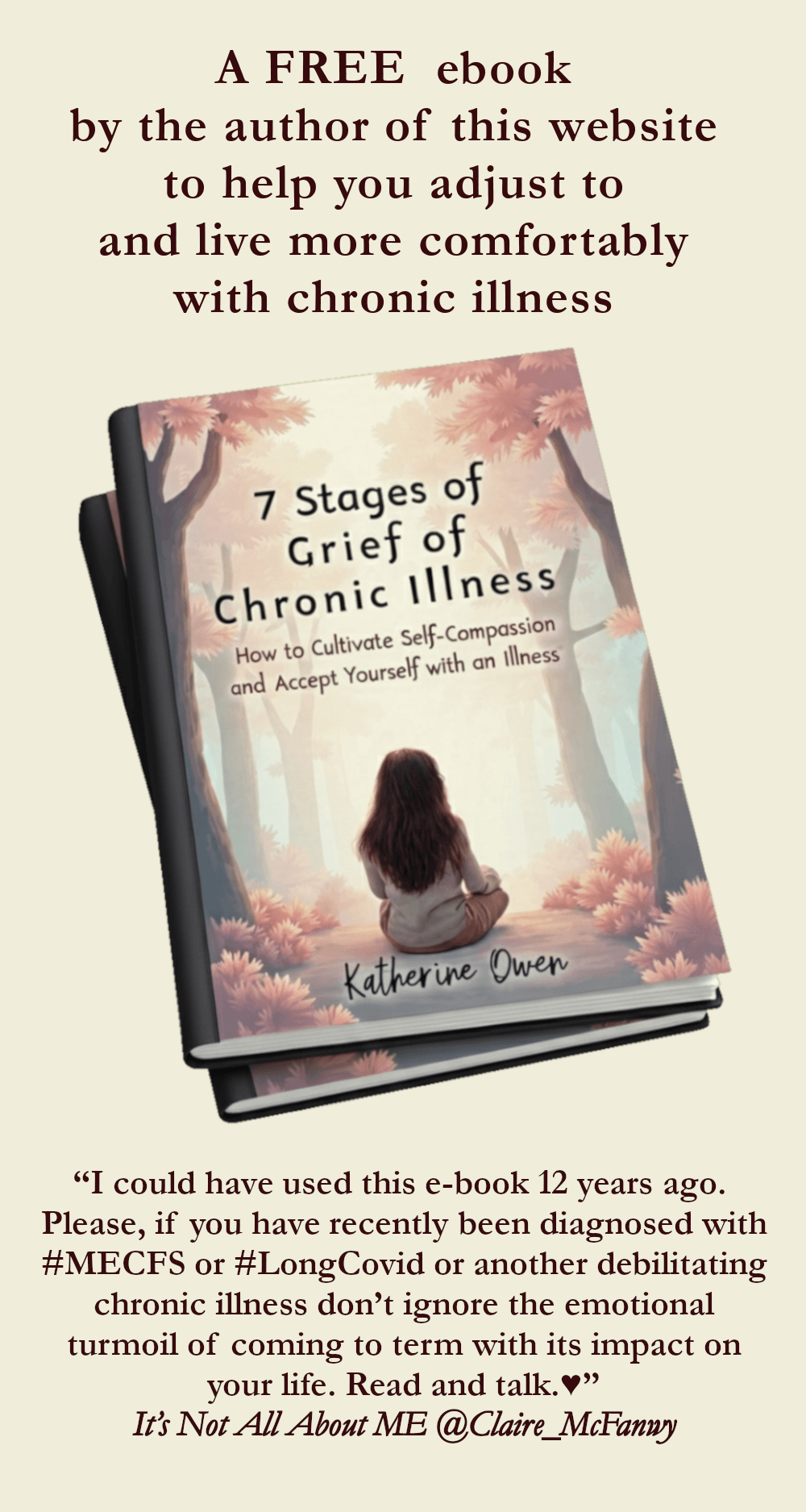and move towards health
Food sensitivity - a possible cause of
fatigue and chronic illness
Most people have heard of food allergy. Far fewer people have heard of food sensitivity.
Food sensitivities can lead to serious symptoms such as fatigue.
This website is written by someone - myself - who lives with the chronic illness ME/CFS.
I have met someone diagnosed with this illness who eliminated certain foods and was able to return to a pretty normal level of functioning.
If you experience fatigue or other symptoms without a clearly defined cause, it is well
worth exploring to see if a certain food is making you ill.
Or click here to CHOOSE FROM
A RANGE OF personalizable cards and gifts.
The healing-themed gifts are designed by myself, Katherine, the author of
this website HealingCFSME.com
Proceeds go towards the cost of the website. Thank you. Enjoy!
Contents for Food Sensitivity
- Food sensitivity vs Food allergy - What is the difference?
- How do you determine food sensitivity? - Exclusion diet
- Reintroducing a food which causes fatigue or other symptoms
- What is a rotation diet?
- My experience of food sensitivity and Chronic Fatigue Syndrome
- Action plan to explore whether food sensitivity is an issue for you
Food sensitivity vs Food allergy
What is the difference between food sensitivity and food allergy.
- With food allergy, symptoms from eating certain foods are
likely to be immediate and may be dramatic.
With food sensitivity the symptoms may be delayed or simply contribute to underlying fatigue or other ongoing symptoms. (NB. This can also be true of food allergy.) - Food allergy may show up in allergy tests.
Food sensitivity will probably not show up in allergy tests.
If your doctor has tested you for food allergy with negative results, she or he may not give you any further advice about your diet. This is where knowledge of food sensitivity becomes so important! - With
food allergy, the advice is to avoid a certain food.
With food sensitivity, by making sure you don't eat the food too often or in too great quantities, you may be able to eat the food without experiencing symptoms. - Food allergy can be life threatening.
Food sensitivity is not. Food sensitivity does however cause low grade chronic symptoms which significantly impair your quality of life.
For example, you might have the symptoms of fatigue, stomach pain, headaches or eczema.
Click through for advice on how to stop itching.
How do you determine food sensitivity? - Exclusion diet
To determine food sensitivity, you need to eliminate the
suspect foods and then slowly reintroduce them while monitoring for any change
in your health.
Foods which commonly lead to both food allergy and food sensitivity are the following:
- wheat
- rye
- barley
- dairy products
- chocolate
- oranges
If you have a compulsion for a certain food it may be an indication of sensitivity. You may feel better immediately after eating the food in the same way a drug addict feels better after taking a drug. You are effectively easing any withdrawal symptoms. (Alternatively, a compulsion for a certain food may be your intuitive guidance about something which is good for you.)
Reintroducing a food which causes fatigue or other symptoms
Once you have determined a food to which you are sensitive, you need to take a break from eating it.
You can then re introduce the food into your diet by eating a small portion on a single day.
If you don't have symptoms you then have a choice.
If the food is not important to you and is easy to avoid, you may be happy to eat it only rarely.
Or you can experiment to find out if there is a way to eat the food more often without
symptoms.
You may find that if you eat it less often (a rotation diet) you are symptom free.
Or you may find that if you eat it in smaller quantities, you are symptom free.
Alternatively, if the symptoms are dramatic, you may need to avoid the food.
What is a rotation diet?
A rotation diet is one where the foods are eaten in rotation and not continuously.
A typical British diet, for example, might include milk and bread every day. With a rotation diet you would avoid such repetition .
A rotation diet may allow you to eat foods that you would otherwise become sensitive to.
It can also allow you to eat a food that is already a known problem food for you.
If you live with Chronic Fatigue Syndrome-ME or have a compromised immune system for another reason, I do advise a rotation diet. You are at risk of developing food
sensitivity. A rotation diet can allow you to avoid that from happening and therefore allow you to have a more varied diet.
My experience of food sensitivity and Chronic Fatigue Syndrome
I lived with very severe Chronic Fatigue Syndrome for many years. As part of a Chronic Fatigue Syndrome diet, I was on a permanent rotation diet.
In my case, once I was no longer healthy enough to make myself a meal or walk to the kitchen, I had snacks by the bed. I was at a level where even these were difficult to reach and eat due to the muscle fatigue in my arms and hands.
I ate the snacks if a caregiver did not turn up. Typically when there were days in a row when this happened, I became sensitive to the food and was no longer able to eat it.
My regular diet was set up to stop me developing food sensitivities by ensuring that I did not have any one food for two days in a row.
I won’t dig it out at the moment, but if anyone reading this
is living with severe CFS/ME and would like a copy of the rotation diet I
followed for many years, you can contact me.
My Chronic Fatigue Syndrome
diet was
checked by 2 dieticians on separate occasions and passed as being
healthy. I was however advised that I needed more calcium (I was not
eating dairy
products).
I warn you though that the CFS diet I had was very boring and designed for caregivers
to use.
It involved eating the same meal three times a day.
The time allocated for carers was short and there wasn't time to organise cooking different things.
My communication was minimal so I couldn't ask for something different to be cooked.
Action plan to explore whether food sensitivity is an issue for you
Ask yourself:
- Is there a food that I suspect may be causing fatigue or other symptoms I experience?
- Do I want to have a test done for food allergies?
- Is there a food I choose to avoid eating every day?
- If I choose to take action in this area, what action will I take?
- When will I start?
Receive daily inspiration...
by putting your favorite (favourite) healing quote on
a mug, cushion, postcard, coaster, T shirt etc.
You will find my zazzle gift store at
zazzle.com/HealingStore.
Use one of my designs or start from a blank.
Thank you from me, Katherine, author of HealingCFSME.com
Wishing you health both within and beyond illness,
Katherine
Katherine T Owen
Katherine T Owen runs this website - www.HealingCFSME.com.
She is author of Be Loved, Beloved (Read it in paperback at lulu.com or on kindle)
Click for an article on Chronic Fatigue Syndrome diet which links to 3 other suggested diets which may alleviate symptoms.
 |
© Katherine T Owen. All articles on this website are copyrighted. I am delighted if you choose to click above to share this page on social media, but please
do not copy, print or otherwise use without my permission. Thank you. Disclaimer:
I am not a medical practitioner. The articles on this website are not
to be taken as medical advice. Please consult a medical practitioner as
necessary. |











